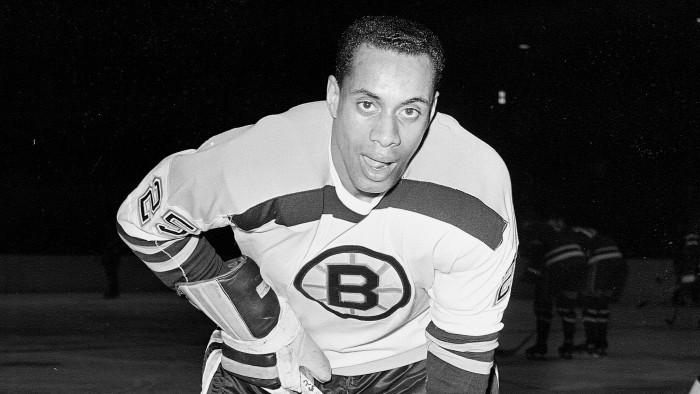
By Dr. Fred J. Cromartie, Ed.D. |
William Eldon “Willie” O’Ree and Willy T. Ribbs were pioneers.
O’Ree was the first black player in the National Hockey League. While O’Ree’s NHL career consisted of just 45 games over two seasons, it is the historical impact of his NHL career that led him to Honored Member status in the Hockey Hall of Fame.
Born in Fredericton, New Bruinswick, O’Ree learned to skate when he was three. He loved to skate any chance he could and started to play organized hockey when he was five. Growing up O’Ree played in competitive hockey leagues and would play for the Kitchner Canucks of the Ontario Hockey Association in the 1955-56 season. Then he would sign with the Quebec Aces for the 1956-57 season, which would be the start of a three decade (mostly minor) professional career. Willie scored 22 times, helping the Aces win the Edinburgh Trophy, awarded to the winners of a series between the senior champions of the Western Hockey League and the Quebec Hockey League.
Because of his playing style, O’Ree was noticed by the Boston Bruins and called up by the Bruins. His first game with the Bruins was on January 18, 1958 against the Montreal Canadians. That season, he played only two games for the Bruins and was sent back to the minors. O’Ree got a second opportunity with the Bruins in the 1960-61 season, playing in 43 games, scoring four goals, ten assists, for fourteen points.
While playing in the National Hockey League, O’Ree paid a price for being there: Racism. Although the Boston fans were friendly, he received racial taunts and slurs from fans while on the road. Opposing players did the same thing; in addition, he received many cheap shots and got into fights to defend himself. Unfortunately, after that season, his National Hockey League career came to an end, as he never played in another NHL game again. From there, he played in the minor professional leagues. First with the Ottawa-Hull Canadians of the Eastern Professional hockey League, then became a mainstay in the Western (Professional) Hockey League, with the Los Angeles Blades and the San Diego Gulls. His last stop was with the San Diego Hawks of the PHL, in the 1978-79 season.
After O’Ree’s playing career was over in 1998, he became the Director of Youth Development for the NHL/USA Hockey Diversity Task Force, a non-profit program for minority youth that encourages them to learn and play hockey.
Awards and honors later followed. He was inducted into the New Bruinswick Sports Hall of Fame in 1984. He received the Lester Patrick Award, which annually awards an individual for hockey service in the United States, in 2000; he received the Order of New Bruinswick in 2005 and was honored with the naming of Willie O’Ree Place, or Place Willie O’Ree in French, at the Fredericton Arena in 2008.

William Theodore Ribbs raced cars professionally and was the first African American to compete in the Indianapolis 500 and one of the only African American NASCAR racers.
Ribbs’ racing began at the age of four, his first foray into motorsports driving Formula Ford cars in Europe after his high school graduation in 1975. He won the Dunlop Championship in his first year of competition, returning to the United States and racing Formula Atlantic cars. Ribbs won the pole in the Long Beach Formula Atlantic race in 1982, outpacing veteran drivers before his engine failed. In 1983, he won five races in the SCCA Trans-Am and was honored as Pro Rookie of the Year. After competing in two NASCAR Winston Cup races in 1986, financial difficulties including the lack of corporate sponsorship kept his team from finishing the season.
In 1989, Bill and Camille Cosby stepped in and funded the Raynor-Cosby Motorsports team with Ribbs as the star driver. Ribbs won two top-ten events in his 1990 Championship Auto Racing Team (CART) Indianapolis debut. In 1991, he became the first African American to qualify for the Indianapolis 500, and he qualified again in 1993. However, by 1994 it was clear that corporate sponsors were not yet willing to back an African American motorsports athlete, despite Cosby’s offer of free television commercials in return for sponsorship. Ribbs was released from his Indianapolis 500 contract and spent the year competing in the CART series, finishing in the top ten at Michigan and Denver Grand Prix races.
In 1999, Ribbs raced in the Las Vegas Indy Racing League (IRL). In 2000, he signed with Victoria Motorsports SCCA Trans-Am team and finished second at Long Beach, third at Detroit and fourth at Las Vegas. He was awarded the Johnson Triple Crown. In 2001, Ribbs joined the NASCAR Craftsman Truck Series with the support of Dodge, which initiated a motorsports diversity program to provide opportunities for minorities to race. This made Ribbs the first African American in the modern era to compete full-time in a major NASCAR division.
Dr. Cromartie is the Director of Doctoral Studies at the United States Sports Academy.